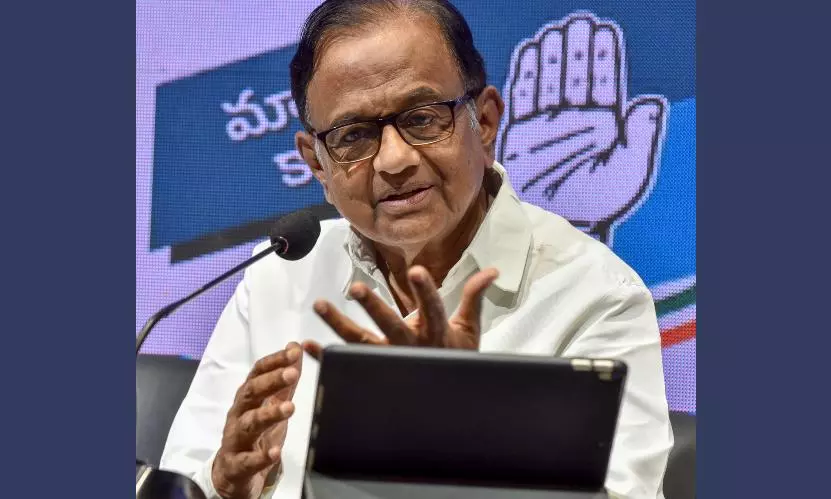
Chidambaram says military retaliation after 26/11 dropped due to US pressure; BJP reacts
Congress leader reveals then US Secretary of State flew to Delhi to urge restraint; BJP slams Congress for 'mishandling' the crisis under foreign influence

Senior Congress leader P Chidambaram has acknowledged that the UPA government decided against military retaliation on Pakistan after the 26/11 Mumbai terror attacks, citing intense international pressure, particularly from the United States.
Chidambaram, who took charge as Union home minister days after the attack, said “retribution crossed my mind” but the decision was shaped by the Ministry of External Affairs and senior diplomats.
Also Read: Karur Stampede: Chidambaram says ‘errors on all sides’
International pressure after 26/11
Speaking to a Hindi news channel, he recalled, "The whole world descended on Delhi to tell us not to start a war."
He revealed that then US Secretary of State Condoleezza Rice flew to Delhi within days of the attack to urge India to exercise restraint.
"Condoleezza Rice, who was then US Secretary of State, flew in two or three days after I took over, to meet me and the Prime Minister. And to say, please don't react," Chidambaram said.
"I said this is a government decision… it did cross my mind that we should do some act of retribution," Chidambaram noted.
Retaliation plan dropped
Chidambaram went on to say that he discussed a possible retaliation with the prime minister and "other people who mattered."
"The prime minister had discussed this (retaliatory military action) even when the attack was going on... And the conclusion was, largely influenced by the Ministry of External Affairs, and the IFS, that we should not physically react to the situation," he recalled.
As many as 175 people were killed in the 26/11 attacks that were carried out by Lashkar-e-Taiba terrorists across multiple Mumbai locations, including CST, Taj Mahal Palace Hotel, Oberoi Trident, and Nariman House. Only one attacker, Ajmal Kasab, was captured alive; he was executed in 2012.
Also Read: Chidambaram hits back at trolls amid row over 'homegrown terrorists' remark
BJP slams Congress
Chidambaram’s remarks have sparked a political row, with the BJP accusing the Congress of “mishandling” the crisis under foreign pressure.
Union Minister Pralhad Joshi posted the interview clip on X, saying, "After 17 years, Chidambaram, Former Home Minister admits what the nation knew - 26/11 was mishandled due to pressure from foreign powers. Too little, too late."
BJP spokesperson Sudhanshu Trivedi pointed to the 2009 Sharm El-Sheikh joint declaration with Pakistan, which controversially mentioned Balochistan.
"From 2005 to 2006-07, terrorist attacks were happening one after another in India, and in 2007, the Joint Declaration happens in Havana. They say that Pakistan is also a victim of terrorism just like us. Nine months after the 26/11 attacks, in July 2009, they go to Sharm El-Sheikh in neutral destination Egypt and sign a Joint Declaration with Pakistan, saying that terrorism will not affect peace talks," Trivedi said.
Also Read: 'Congress has no future': BJP gloats over Chidambaram's INDIA Bloc remarks
Sonia's 'influence' questioned
Another BJP spokesperson, Shehzad Poonawalla, questioned whether Congress leader Sonia Gandhi or then prime minister Manmohan Singh overruled Chidambaram’s inclination toward retaliation, alleging the UPA government appeared to act under the influence of Condoleezza Rice.
"Why was the UPA taking orders from her (Condoleezza Rice)? Why did Sonia Gandhi prevail over the Home Minister?" he asked.
He alleged that Chidambaram was initially reluctant to take charge as home minister in the wake of the Mumbai attacks, wanted military action against Pakistan, but "others prevailed".
He further accused the Congress of giving Pakistan a “clean chit” not only on 26/11 but also in the 2007 Samjhauta Express blast, claiming the UPA promoted a "Hindu terror" narrative while granting Pakistan Most Favoured Nation (MFN) status despite repeated cross-border attacks.

